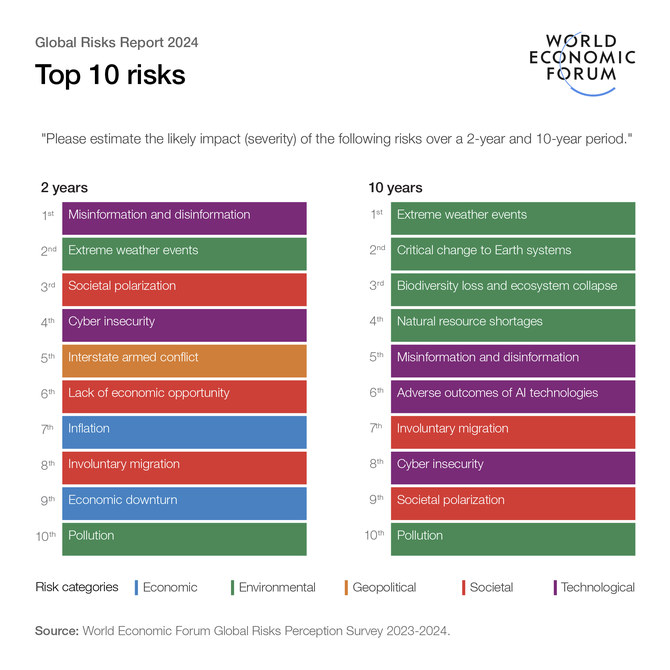GENEVA: A rise in artificial intelligence-driven fake news and social unrest are among the greatest global risks in 2024, the World Economic Forum has suggested.
The organization’s Global Risks Report, released on Wednesday, said that the intertwined risks of AI-driven false information and societal polarization are likely to become more pronounced during elections in several major economies during the next two years.
The risks come amid a persistent cost-of-living-crisis, economic uncertainty, and deepening economic and technological divides.
According to the report, barriers to economic mobility may prevent large segments of the global population from accessing economic opportunities.
The issue is more prevalent in conflict-prone or climate-vulnerable countries, which may become increasingly isolated from investment, technologies and associated job market.
Environmental risks are the greatest long-term concern, with two-thirds of global experts worried about extreme weather conditions, biodiversity loss, ecosystem collapse, natural resource shortages and pollution.
The report ranked these five climate risks among the top 10 threats facing the world over the next decade.
“An unstable global order characterized by polarizing narratives and insecurity, the worsening impacts of extreme weather, and economic uncertainty are causing accelerating risks, including misinformation and disinformation, to propagate,” WEF Managing Director Saadia Zahidi said in a press statement.
“World leaders must come together to address short-term crises, as well as lay the groundwork for a more resilient, sustainable, inclusive future.”
The report called on world leaders to work together to confront the highlighted threats, urging them to focus on the most disruptive emerging risks, with agreements addressing the integration of AI in conflict decision-making, for example.
It also recommended strengthening individual and state resilience through digital literacy campaigns on misinformation and disinformation.
“Artificial intelligence breakthroughs will radically disrupt the risk outlook for organizations, with many struggling to react to threats rising from misinformation, disintermediation and strategic miscalculation,” said Carolina Klint, chief commercial officer, Europe, at Marsh McLennan.
“At the same time, companies are having to negotiate supply chains made more complex by geopolitics and climate change and cyber threats from a growing number of malicious actors.
“It will take a relentless focus to build resilience at organizational, country and international levels — and greater cooperation between the public and private sectors — to navigate this rapidly evolving risk landscape,” she said.
Action points highlighted by the report include more research and development on climate modelling and technologies with the potential to accelerate energy transition.



























